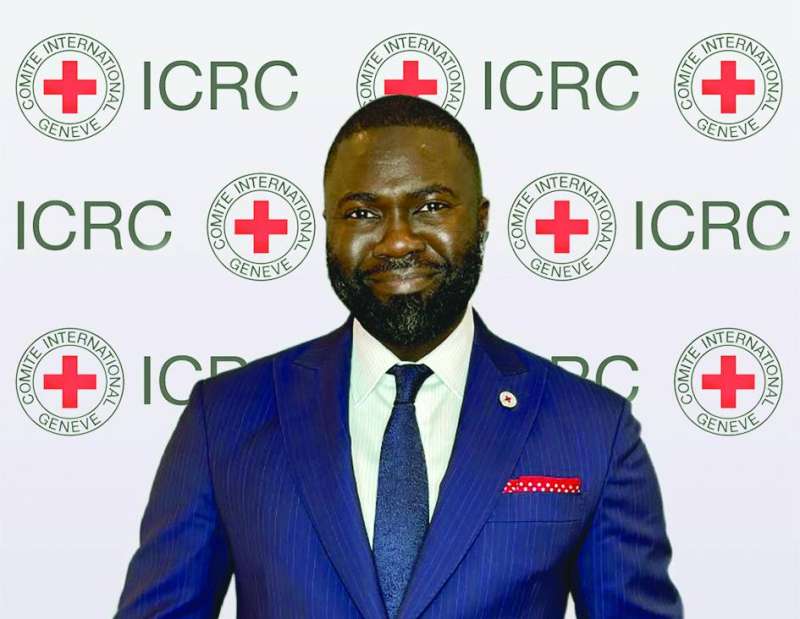05/12/2023
05/12/2023

KUWAIT CITY, Dec 4: The regional head of the International Committee of the Red Cross delegation for the Gulf Cooperation Council countries, Mamadou Sow, stressed that “the issue of missing Kuwaitis, as a result of the Iraqi occupation, is a topic that receives great attention, and is being followed intensively and consistently, but silently,” adding, “We meet regularly with the Kuwaitis, Iraqis, Saudis, British and Americans” on the issue of missing persons.
Sow told Al-Rai daily, “This file has not been closed, and as long as there are families who have not found their loved ones, we will continue, because families have the right to know the fate of their loved ones, and we hope to make more progress on this issue in the coming years.”
He added, “We have been present in the country for 32 years, and we have a distinguished relationship with Kuwait that has grown over the years. Kuwait has supported the growth of the International Committee of the Red Cross in the past few decades, allowing the organization to respond to humanitarian needs around the world.”
He went on to say, "In the past few decades, we have witnessed the Middle East turning into hell with wars in occupied Palestine, Iraq, Syria, and Yemen, as well as in Africa, in the Lake Chad region, Mali, South Sudan, Burkina Faso, and others."
Commenting on the role of the International Committee of the Red Cross in the region, he explained that “Kuwait was the regional office of the Committee, and offices were opened in Qatar, the United Arab Emirates, Oman and the Kingdom of Saudi Arabia, as the Committee saw the Gulf Cooperation Council as a wonderful ecosystem interested in humanitarian work.”
He stated that the committee “is present in about 100 countries, and we have more than 30,000 employees, with more than 100 conflicts around the world, and the matter is not limited to conflicts between countries only, but also conflicts within countries, some of which are in the spotlight because of the media. Some of them are hidden and not mentioned by the media.”
He continued, "In the International Committee, we have engineers, lawyers, doctors, and even weapons specialists, soldiers and army officers, and specialists in financial affairs. We also have about 20 million volunteers, which makes us the largest humanitarian network in the world. We have a saying in the Red Cross and Red Crescent that says we are everywhere." “In times of peace or war, we exist.”
He pointed out that “the International Committee of the Red Cross is the first to respond and the last to leave in any conflict, and when war breaks out and organizations expel their people from the region, we mobilize our people to move there.”
“An unbearable humanitarian tragedy is unfolding before our eyes in Gaza,” Su said. “The hostilities taking place in densely populated urban areas, including around hospitals, are endangering the lives of the most vulnerable people, such as medical staff, the sick and wounded, children, people with disabilities and the elderly. At the same time, our teams lack the basic security conditions to move in northern Gaza,” adding, “We are in constant contact with the Ministry of Health in Gaza and with the parties, but our teams have been exposed to security incidents, and we need basic safety conditions to be able to work.”
He continued saying, “The International Committee is deeply concerned about the dangerous and unsafe conditions under which civilians are being evacuated. There are men, women and children, waving white flags, walking dozens of kilometers in front of corpses lying in the streets, without necessities such as food and water,” stressing “the need for parties to the conflict to adhere to international humanitarian law, which places civilians, medical facilities and humanitarian workers with protection under humanitarian law.” International».
He added, “The International Committee is highly respected around the world because of its neutrality, and through my experience in the region, the Gulf Cooperation Council countries appreciate the contribution and professional competence, and our neutrality represents an added value. The International Committee does not take sides in the conflict. It is a private organization and is not affiliated with any government. Therefore, it is independent in a way, and is very concerned with maintaining its neutrality and impartiality, and this is the true basis of its work.
Sow, confirmed that “the role of the Committee is to support victims of war, not only in terms of basic services, but also about respect for life and dignity,” noting that “the needs of the International Committee “It is very broad and increasing every year, and this is a big problem, and when we get less support, more people suffer.”
Sow said, “We do not take sides with any political party, and whenever we face violations of international law, we deal directly and bilaterally with anyone who can make a change on the ground, and as long as they control a region and are waging a war, we believe that they must be held accountable.” He added, “We find them, track them, deal with them, maintain the confidentiality of the conversations, and put the interests of those affected at the forefront of our work.”
The International Committee of the Red Cross is a beacon of hope for many who have experienced the scourge of war and natural disasters. It was founded in 1863 and plays a decisive role in providing humanitarian assistance to those in need around the world. It works by the principles of humanity, neutrality and impartiality. It intervenes in the internal conflicts of states, and focuses on alleviating the suffering of people affected by armed conflicts and natural disasters, without discrimination or selection.


